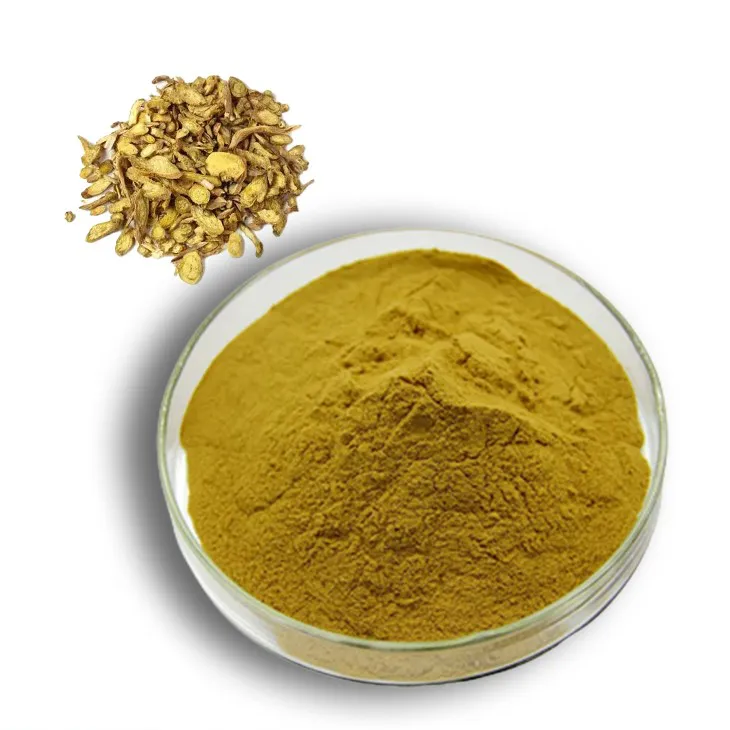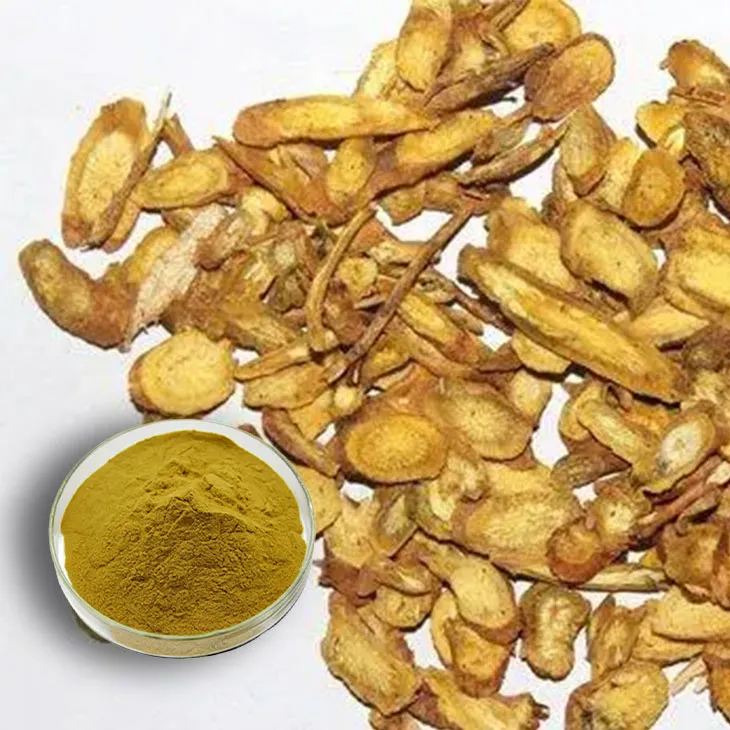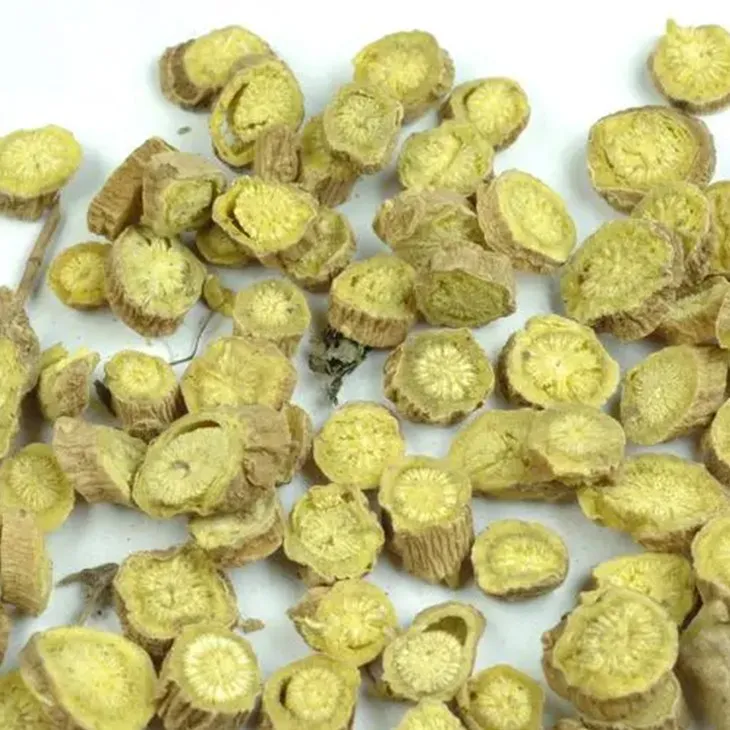- 0086-571-85302990
- sales@greenskybio.com
Organic Baicalin: Naturally Boost the Immune System.
2024-11-11

Introduction to Organic Baicalin
Organic Baicalin is a remarkable natural substance that has been garnering significant attention in the field of health and immunity. Baicalin is a flavonoid compound that is sourced from certain plants. It has emerged as a potential agent for strengthening the immune system, which is of utmost importance in maintaining overall health and well - being.

The Importance of a Strong Immune System
A strong immune system is the body's natural defense mechanism against a myriad of threats. It acts as a shield, protecting the body from harmful pathogens such as bacteria, viruses, and fungi. When the immune system is functioning optimally, it can quickly recognize and eliminate these foreign invaders, thereby preventing infections and diseases. Moreover, a well - balanced immune system also plays a role in preventing autoimmune disorders, where the body's immune cells mistakenly attack its own tissues.

Baicalin's Antioxidant Properties
What are Antioxidants?
Antioxidants are substances that can prevent or slow damage to cells caused by free radicals. Free radicals are unstable molecules that are produced as a by - product of normal cellular metabolism. They can also be generated by external factors such as pollution, radiation, and smoking. These free radicals have unpaired electrons, which make them highly reactive and they can cause oxidative stress by stealing electrons from other molecules in the body, leading to cellular damage.
Baicalin as an Antioxidant
Baicalin's antioxidant capabilities are crucial for immune enhancement. It has the ability to neutralize free radicals, thus reducing cellular damage. By doing so, it creates a more favorable environment for immune cells to function. When cells are protected from oxidative stress, they can perform their functions more effectively, such as the production of antibodies and the activation of immune responses.

Enhancement of Macrophage Activity
Role of Macrophages in the Immune System
Macrophages are key immune cells that play a vital role in the body's defense against foreign invaders. They are part of the innate immune system and are responsible for engulfing and destroying foreign particles, including bacteria, viruses, and dead cells. Macrophages can recognize these foreign substances through various receptors on their cell surface. Once they detect a pathogen, they surround it and internalize it within a vesicle, where it is then broken down and digested.
How Baicalin Affects Macrophages
Baicalin can enhance the phagocytic activity of macrophages. This means that it can make macrophages more efficient at engulfing and destroying foreign invaders. By increasing the activity of macrophages, baicalin helps in preventing infections. For example, in a study, it was found that when macrophages were treated with baicalin, their ability to phagocytose bacteria was significantly increased. This not only helps in the immediate defense against infections but also in maintaining the overall balance of the immune system. A well - functioning macrophage population can keep the levels of pathogens in check and prevent the overgrowth of harmful microorganisms.

Regulatory Effect on the Adaptive Immune System
Understanding the Adaptive Immune System
The adaptive immune system is a more specialized part of the immune system that develops over time. It is capable of recognizing specific pathogens and mounting targeted immune responses. This system involves the activation of lymphocytes, such as T cells and B cells. T cells can directly kill infected cells, while B cells produce antibodies that can neutralize pathogens. The adaptive immune system also has a memory function, which allows it to respond more quickly and effectively to previously encountered pathogens.
Baicalin's Role in the Adaptive Immune System
Studies suggest that baicalin may have a regulatory effect on the adaptive immune system. It can potentially influence the activation, proliferation, and function of lymphocytes. For instance, it may help in modulating the production of cytokines, which are signaling molecules that play a crucial role in immune cell communication. By regulating the adaptive immune system, baicalin becomes an important component in the body's immune - defense network. It can ensure that the immune response is appropriate, neither under - reactive nor over - reactive. An over - reactive adaptive immune system can lead to allergic reactions or autoimmune diseases, while an under - reactive one can result in increased susceptibility to infections.
Baicalin in Scientific Research
Studies on Baicalin's Immune - Boosting Effects
There have been numerous scientific studies on baicalin's immune - boosting effects. In vitro studies have shown how baicalin can interact with immune cells and enhance their functions. For example, cell culture experiments have demonstrated its ability to increase the viability and activity of immune cells such as macrophages and lymphocytes. In vivo studies in animal models have also provided evidence of baicalin's potential in enhancing the immune system. These studies have observed improvements in immune parameters such as increased antibody production, enhanced phagocytic activity, and better resistance to infections in animals treated with baicalin.
Future Research Directions
While the current research on baicalin is promising, there are still many areas that need further exploration. Future research could focus on understanding the exact molecular mechanisms by which baicalin regulates the immune system. This could involve studying its interactions with specific receptors on immune cells or its influence on intracellular signaling pathways. Additionally, more clinical trials in humans are needed to determine the safety and efficacy of baicalin for immune - boosting purposes. These trials could help in establishing appropriate dosages and treatment regimens for baicalin - based immune - enhancing therapies.
Baicalin in Natural Sources
Plants Containing Baicalin
Baicalin is found in certain plants. One of the well - known sources is the Scutellaria baicalensis Georgi, also known as Chinese skullcap. This plant has been used in traditional Chinese medicine for centuries. Other plants may also contain baicalin, although in different concentrations. The extraction of baicalin from these natural sources is an area of interest, as it can provide a natural and potentially safer alternative to synthetic immune - boosting agents.
Benefits of Natural Sources of Baicalin
Using natural sources of baicalin has several benefits. Firstly, it is often considered more holistic and may be associated with fewer side effects compared to synthetic drugs. Secondly, natural sources may contain other beneficial compounds that can work synergistically with baicalin to enhance its immune - boosting effects. For example, plants may contain other flavonoids, vitamins, or minerals that can contribute to overall immune health. However, it is important to note that the extraction and purification processes of baicalin from natural sources need to be carefully controlled to ensure the quality and consistency of the final product.
Conclusion
In conclusion, organic baicalin is a natural substance with great potential for enhancing the immune system. Its antioxidant properties, ability to enhance macrophage activity, and regulatory effect on the adaptive immune system make it a promising candidate for immune - boosting therapies. Scientific research has provided evidence of its beneficial effects on the immune system, although more studies, especially in humans, are needed. The presence of baicalin in natural sources also offers a natural alternative for those seeking to improve their immune health. As our understanding of baicalin continues to grow, it may become an important part of the arsenal of natural immune - enhancing agents.
FAQ:
What is organic baicalin?
Organic baicalin is a flavonoid compound found in certain plants. It has been the subject of much scientific research because of its potential health benefits, especially in strengthening the immune system.
How does baicalin boost the immune system?
Baicalin boosts the immune system in several ways. Its antioxidant capabilities neutralize free radicals, reducing cellular damage and providing a better environment for immune cells to function. It also enhances the phagocytic activity of macrophages, which are important for engulfing and destroying foreign invaders. Additionally, it may have a regulatory effect on the adaptive immune system.
What are the antioxidant capabilities of baicalin?
The antioxidant capabilities of baicalin are very important for immune enhancement. It can neutralize free radicals, which are unstable molecules that can cause damage to cells. By doing so, it helps to reduce cellular damage and creates a more favorable condition for the immune cells to work properly.
Why are macrophages important in the immune system and how does baicalin affect them?
Macrophages are key immune cells responsible for engulfing and destroying foreign invaders such as bacteria and viruses. Baicalin can enhance the phagocytic activity of macrophages. This means it helps macrophages to be more effective in their role of removing harmful substances from the body, which is beneficial for preventing infections and maintaining the overall balance of the immune system.
What is the regulatory effect of baicalin on the adaptive immune system?
While the exact mechanisms are still being studied, studies suggest that baicalin may have a regulatory effect on the adaptive immune system. The adaptive immune system is a part of the body's immune - defense network that can recognize and remember specific pathogens. Baicalin's regulatory effect may help this system to function more effectively, but more research is needed to fully understand this relationship.
Related literature
- Title: The Immunomodulatory Effects of Baicalin: A Review"
- Title: "Baicalin and Its Role in Immune System Function and Health"
- Title: "Organic Baicalin: A Promising Natural Immune Booster - Recent Research Findings"
- ▶ Hesperidin
- ▶ Citrus Bioflavonoids
- ▶ Plant Extract
- ▶ lycopene
- ▶ Diosmin
- ▶ Grape seed extract
- ▶ Sea buckthorn Juice Powder
- ▶ Fruit Juice Powder
- ▶ Hops Extract
- ▶ Artichoke Extract
- ▶ Mushroom extract
- ▶ Astaxanthin
- ▶ Green Tea Extract
- ▶ Curcumin
- ▶ Horse Chestnut Extract
- ▶ Other Product
- ▶ Boswellia Serrata Extract
- ▶ Resveratrol
- ▶ Marigold Extract
- ▶ Grape Leaf Extract
- ▶ New Product
- ▶ Aminolevulinic acid
- ▶ Cranberry Extract
- ▶ Red Yeast Rice
- ▶ Red Wine Extract
-
Lotus leaf extract
2024-11-11
-
Aguaje Extract
2024-11-11
-
Dandelion Leaf Extract
2024-11-11
-
Hesperidin
2024-11-11
-
Buckthorn bark extract
2024-11-11
-
Yellow Pine Extract
2024-11-11
-
Horse Chestnut Extract
2024-11-11
-
Gynostemma pentaphyllum extract
2024-11-11
-
Kupilu Extract
2024-11-11
-
Motherwort Extract
2024-11-11





















